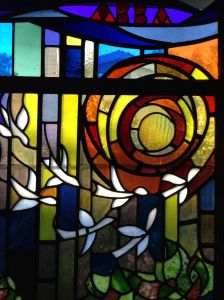Friday
Romans 3:19-28
There is no distinction, 23since all have sinned and fall short of the glory of God; 24they are now justified by his grace as a gift, through the redemption that is in Christ Jesus,
I was baptized in a Lutheran congregation as a child, in the church where my father had been raised. My mother was raised in a Lutheran congregation. Their parents were all from Scandinavia, so of course they belonged to Lutheran churches. I made my confirmation in a Lutheran church; I attended a Lutheran college; I went to a Lutheran Seminary. But it was in my fourth year of seminary that I became a Lutheran.
I was one of those students who would ask the provocative question. I was never content to take notes and regurgitate answers; I wanted to understand, to push through to the heart of the matter. So one day, when my required World Missions class had a guest speaker from the Lutheran Church in Thailand, I raised my hand and asked “Why do you, a person from (then) 20th century Thailand, identify with a 16th century German monk?”
Without being phased at all, he answered me: “I don’t identify with a 16th century German monk; I identify with his understanding of the Gospel.”
In that moment all the light bulbs went off and I became a Lutheran. The Lutheran expression of Christian faith isn’t about the culture of church music, hymns, coffee and potluck suppers. It is about an idea. One central, unshakeable idea: God has come to make us his own for no reason but his own goodness. God has come to give salvation as a gift. God has come to heal a broken world, forgive an indebted world, deliver a captive world, redeem a world in bondage. God is the physician who does not ask whether her patient is worthy of her ministrations; she simply works to save the life of the patient before her. God is the lifeguard who does not ask what kind of idiot swims out beyond their depth. God is the fireman rushing up the World Trade Center without asking if its safe; there are people to be rescued and a fire to be extinguished.
Lutherans call it grace. The official phrase the 16th century reformers used to summarize all this is: justification by grace through faith. We are brought into a right relationship with God by his free gift and favor, a relationship that is a relationship of faith, of trusting the gift that is given.
There are other things to talk about in Christian faith. What does it mean for us to live as sons and daughters of the Most High? What is our mission in the world? What does the scripture mean when it calls us to holiness of life? Lutherans can argue about all manner of things – and usually do: sexual ethics, capital punishment, worship and liturgy, gender neutral language, the authority of bishops, whether we should even call them bishops. But none of this defines us. What defines us – or should define us – is this idea of grace. We defend that idea like a dog with a bone.
It’s not grace and works. It’s not grace and a certain spiritual experience. It’s not grace and a doctrine. It’s not grace and democracy or capitalism or liberalism or anything. It is just grace. Life is gift. Redemption is gift. Forgiveness is gift. The life of the age to come is a gift. It is not the only doctrine, but it is the font of all other doctrines.
Yes it’s a gift that is of no use unless you receive it. But the receiving of it is no credit to us. No one stands around on Christmas morning to say, “Oh, look how well you opened that gift!” They ooh and aah at the gift.
Sunday morning is, and should always be, a kind of Christmas morning, oohing and aahing at the gift.
And Christian life is living every day as Christmas day.


 The coming passion still dominates this section of Mark’s gospel as we hear for the third time that Jesus will be shamed and killed in Jerusalem, but “after three days he will rise.” The disciples are still uncomprehending that the Messiah could suffer, and James and John boldly make a play for the premier positions of power and honor at Jesus’ right and left hand “in his glory”. But we who hear this Gospel know that at Jesus’ right and left hand will be the two thieves.
The coming passion still dominates this section of Mark’s gospel as we hear for the third time that Jesus will be shamed and killed in Jerusalem, but “after three days he will rise.” The disciples are still uncomprehending that the Messiah could suffer, and James and John boldly make a play for the premier positions of power and honor at Jesus’ right and left hand “in his glory”. But we who hear this Gospel know that at Jesus’ right and left hand will be the two thieves.





 39For the promise is for you, for your children, and for all who are far away,
39For the promise is for you, for your children, and for all who are far away,